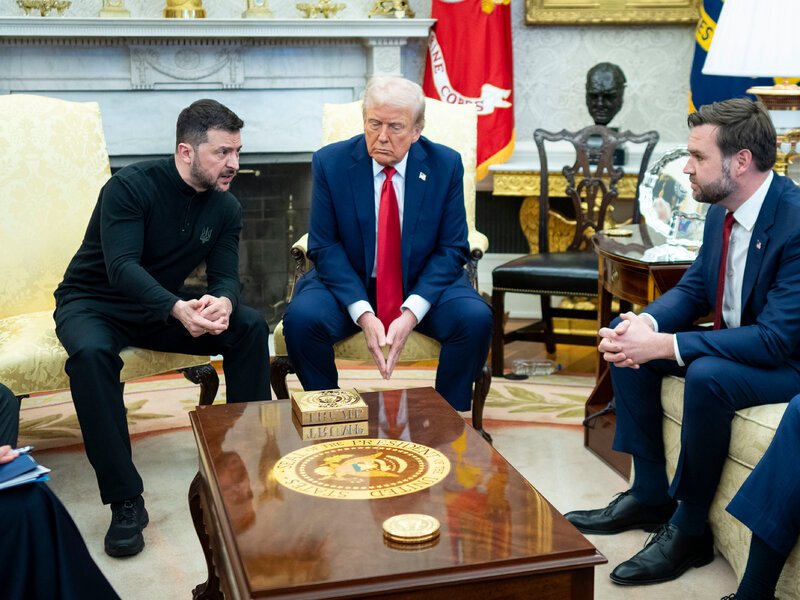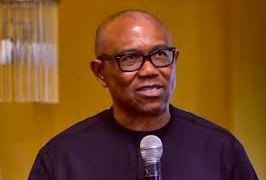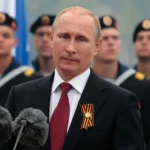By Agbeze Ireke Kalu Onuma, AI-KO
Author’s Note:
This essay is a continuation of my analysis of Donald Trump as the Manchurian Candidate. Part I explored his subversion of democratic norms; Part II exposes his betrayal of a nation under siege. The stakes could not be higher. As Trump cozies up to dictators, the free world must choose: capitulation or courage.
Open in appSign up
Sign in
Trump as the Real Manchurian Candidate, Part II: The Oval Office Ambush and the Unraveling of American Leadership
Agbeze Ireke Kalu Onuma, AI-KO
·Follow
22 min read·
4 hours ago
Listen
Share
By Agbeze Ireke Kalu Onuma, AI-KO
Author’s Note:
.
This essay is a continuation of my analysis of Donald Trump as the Manchurian Candidate. Part I explored his subversion of democratic norms; Part II exposes his betrayal of a nation under siege. The stakes could not be higher. As Trump cozies up to dictators, the free world must choose: capitulation or courage.
– –
On February 28, 2025, the world watched in stunned silence as President Donald Trump and Vice President JD Vance staged a spectacle in the Oval Office that will haunt American democracy for generations. Ukrainian President Volodymyr Zelensky, a leader whose nation has endured three years of brutal Russian invasion, arrived in Washington seeking solidarity. Instead, he was met with a calculated ambush – a performance ripped from the Kremlin’s playbook. The meeting, ostensibly to finalize a U.S.-Ukraine minerals deal, devolved into a televised humiliation of a wartime ally, with Trump accusing Zelensky of “gambling with World War Three” and Vance demanding gratitude like a mob boss collecting tribute.
This was not diplomacy. This was theater – a grotesque display of loyalty to the very autocrats America once vowed to oppose. In my first essay, I argued that Trump’s actions aligned disturbingly with the archetype of the Manchurian Candidate: a figure subverted to serve foreign interests. The events of February 28th erased all doubt.
The meeting began cordially but quickly unraveled when Zelensky raised legitimate concerns about trusting Vladimir Putin. Trump, visibly agitated, interrupted: “You’re gambling with the lives of millions of people.” Vance, echoing Russian propaganda, accused Zelensky of disrespecting the U.S. and dismissed Ukraine’s pleas for security guarantees as “publicity tours.” The vice president sneered, “Have you said thank you once?”
Trump’s ultimatum was chilling: “Make a deal or we are out.” He framed Ukraine’s survival as a transactional burden, declaring, “Without us, he doesn’t win.” When Zelensky tried to explain Putin’s history of broken ceasefires – including the 1994 Budapest Memorandum, where Ukraine surrendered its nuclear arsenal in exchange for territorial guarantees – Trump derided him as “not ready for peace.”
The Ukrainian ambassador, Oksana Markarova, sat with her head in her hands.
At the heart of the confrontation was Trump’s proposed minerals agreement – a deal critics liken to colonial exploitation. Ukraine, desperate for military aid, was pressured to grant the U.S. access to its lithium, graphite, and rare earth metals, resources critical for modern technology. Trump framed this as “repayment” for $180 billion in aid, but the terms were vague, offering no security guarantees or commitments to reclaim occupied territory.
Zelensky had warned the deal would take “10 generations to pay back,” yet Trump demanded it as the price of continued support. The message was clear: Ukraine’s sovereignty is negotiable; its resources are not.
The international response was swift and damning:
European Union: Foreign policy chief Kaja Kallas declared, “The free world needs a new leader,” pledging to bolster Ukraine independently.
– France: Emmanuel Macron rebuked Trump, stating, “Russia is the aggressor. These are simple things to remember.”
– Russia: Dmitry Medvedev gloated about Zelensky’s “brutal dressing-down,” while state media framed the clash as proof of U.S. abandonment.
Pennsylvania Governor Josh Shapiro condemned the administration: “The Oval Office should advance American values – not retreat from them. Today, Trump and Vance served Putin’s propaganda.”
Trump’s isolationism mirrors the Manchurian Candidate’s mission to fracture alliances. By alienating Europe and humiliating Ukraine, he weakens NATO – a longtime Russian objective. As Shapiro noted, Trump is reducing America to a “hemispheric power,” signaling to adversaries that the West is divided.
Trump’s claim that Zelensky’s “hatred” for Putin hinders peace parrots Russian state media. His insistence that Putin “wants to make a deal” ignores the dictator’s genocidal war aims. Even Trump’s focus on Ukraine’s “minerals” aligns with Putin’s own resource-extraction ambitions in occupied territories.
The public degradation of Zelensky – a democratically elected leader – mirrors authoritarian tactics to diminish dissent. Trump’s demand for performative gratitude (“say thank you”) echoes regimes that equate loyalty to the ruler with loyalty to the state.
One veteran posted, “As a military member, I am beyond disgusted. The U.S. voting with Russia at the U.N.? Slava Ukraini!” A 70-year-old wrote, “I’ve never been so ashamed. If I could emigrate today, I would.” A British commentator noted, “Trump humiliated Zelensky, but he humiliated America most of all.”
Lawmakers must codify military aid to Ukraine, bypassing Trump’s obstruction. As Sen. Lindsey Graham warned, “I don’t know if you can ever do a deal with Zelensky anymore.”
The EU must accelerate defense integration and aid. Ursula von der Leyen’s pledge to “stand with Ukraine” must translate into tangible security guarantees.
Governors like Shapiro and media outlets must amplify the truth: Russia started this war. Trump’s false equivalency (“I’m in the middle”) cannot go unchallenged.
Nations must isolate Russia further, targeting its energy exports and oligarchs. As Italian PM Giorgia Meloni urged, “Every division of the West makes us weaker.”
The February 28th ambush was not an aberration – it was the culmination of Trump’s Manchurian trajectory. His actions serve Putin’s goal of dismantling the liberal order, exploiting America’s power to legitimize authoritarianism.
But democracies are resilient. As Zelensky told Fox News, “We want just and lasting peace.” The question is whether America will reclaim its role as a defender of that peace or continue its descent into complicity with tyranny.
In the words of a Ukrainian soldier: “We fight not just for our land, but for the idea that truth still matters.” The world is watching to see if America still believes that too.
Since his inauguration on January 20, 2025, Donald Trump’s presidency has unfolded as a case study in the deliberate dismantling of democratic norms, alliances, and institutions. To understand his actions – whether ambushing Zelensky, withdrawing from international agreements, or pardoning insurrectionists – we must contextualize them within historical precedents of authoritarian consolidation, imperial decline, and subversion by adversarial powers. Trump’s mission is not merely to “disrupt” politics; it is to redefine America’s role in the world as a transactional enabler of autocracy, rather than a defender of liberty.
The term Manchurian Candidate, in relation to our essay, evokes a figure weaponized by foreign powers to destabilize their own nation. While there is no evidence of literal brainwashing, Trump’s actions align uncannily with the outcomes desired by Russia, China, and other adversaries. Consider:
Trump’s hostility toward Ukraine mirrors Putin’s own narrative that Kyiv is an illegitimate state. His refusal to acknowledge Russia’s responsibility for the war – even blaming Ukraine for “starting it” – echoes Kremlin propaganda. As former U.S. Ambassador to Russia Michael McFaul noted, “Trump’s rhetoric is indistinguishable from RT [Russian state media] headlines.”
The minerals deal sought by Trump, which pressures Ukraine to trade resources for aid, replicates China’s “debt-trap diplomacy” in Africa and Asia. By treating allies as extractive opportunities, Trump erodes trust in U.S. leadership, a goal long sought by Beijing.
Historical precedent abounds. In The Manchurian Candidate, the protagonist is manipulated to sabotage his country; Trump’s actions – whether by design or delusion – achieve similar ends. As political scientist Joseph Nye warns in Do Morals Matter?, “Leaders who weaken alliances and empower adversaries do lasting damage, regardless of intent.”
Trump’s policies since January 2025 follow a pattern documented in Daron Acemoglu and James Robinson’s Why Nations Fail: the erosion of inclusive institutions in favor of extractive ones. Examples include:
Attacking the Judiciary: Trump’s pardons of January 6 rioters and threats to prosecute political rivals mirror tactics used by Hungary’s Viktor Orbán to dismantle judicial independence.
– Weaponizing Trade: His tariffs on Mexico, Canada, and China – framed as “America First” – have backfired, raising consumer costs and destabilizing supply chains. This aligns with the “shock doctrine” described by Naomi Klein, where crises are exploited to consolidate power.
– Undermining Elections: Trump’s repeated false claims of voter fraud (despite winning in 2024) and attacks on mail-in voting mirror strategies used by dictators like Venezuela’s Nicolás Maduro to delegitimize opposition.
These actions are not hapless blunders but calculated moves. As historian Timothy Snyder writes in On Tyranny, “Authoritarians rise by hijacking legitimate grievances and replacing institutions with loyalty to a single leader.”
Trump’s affinity for Putin is often dismissed as personal idiosyncrasy, but it reflects a deeper ideological alignment. Consider:
Both men despise NATO, the EU, and multilateral institutions that constrain their power. Trump’s sabotage of Ukraine aid and Vance’s dismissal of European allies (“they can defend themselves”) directly serve Putin’s goal of fracturing NATO.
– Trump’s focus on Ukrainian minerals parallels Putin’s seizure of Crimea for its oil and gas reserves. Both leaders view national sovereignty as secondary to personal or strategic gain.
– Russian state media glorifies Trump as a disruptor of Western unity, while Trump amplifies Kremlin talking points (e.g., “NATO is obsolete”). This synergy was evident in Trump’s 2025 call with Putin, where he reportedly agreed to exclude Europe from peace talks – a move the Financial Times called “a gift to Moscow.”
Intelligence experts have long warned of this dynamic. The 2017 U.S. Intelligence Community Assessment concluded that Russia sought to “undermine faith in democratic institutions” and “help Trump’s election.” Today, Trump repays that debt by advancing Putin’s agenda.
Trump’s presidency echoes pivotal moments in history when leaders accelerated their nations’ decline:
The erosion of democratic norms, scapegoating of minorities, and use of paramilitary forces (e.g., Trump’s praise for the Proud Boys) mirror the collapse of the Weimar Republic into fascism. Trump’s transactional foreign policy – extracting tribute from allies while ignoring existential threats – resembles Rome’s mercenary legions and neglect of barbarian invasions. As historian Edward Gibbon wrote, “Prosperity ripened the principle of decay.”
Like Mikhail Gorbachev, Trump’s chaotic governance (“I alone can fix it”) weakens state capacity. But whereas Gorbachev sought reform, Trump seeks personal aggrandizement.
Peter Heather and John Rapley’s How Empires Collapse argues that empires fall when elites prioritize self-interest over collective survival. Trump’s tax cuts for the wealthy, coupled with austerity for social programs, epitomize this decay.
To counter Trump’s Manchurian trajectory, America and its allies must: Reinforce Institutions; Congress should codify aid to Ukraine, insulate the DOJ from political interference, and expand voting rights. Media must fact-check Trump’s lies relentlessly, as the BBC did during WWII to counter Nazi propaganda. Europe, Japan, and democracies in the Global South must form a “Democratic 10” alliance to counterbalance U.S. unpredictability.
Trump is not an anomaly but a symptom of deeper pathologies: rising inequality, media fragmentation, and a loss of faith in democracy. His mission is not ideological but transactional – to exploit these fractures for power, wealth, and adulation. Yet history shows that such figures ultimately fail when institutions resist and citizens awaken.
As philosopher Hannah Arendt wrote in The Origins of Totalitarianism, “The ideal subject of totalitarian rule is not the convinced Nazi or Communist, but people for whom the distinction between fact and fiction no longer exists.” Trump’s greatest threat is not his allegiance to Putin but his assault on truth itself.
The question is whether America will heed the warnings of history – or become its next cautionary tale.
The selection of JD Vance as Donald Trump’s vice president was not a mere political calculation – it was a strategic embrace of ideological subservience. For those, like me who wondered and questioned why Trump chose a figure with no foreign policy experience and a history of isolationist extremism like himself, Vance’s performances at the Munich Security Conference on February 14, 2025, and his role in the Oval Office ambush of President Zelensky provide a stark answer: Trump does not want a governing partner; he demands a propagandist!. Vance’s value lies not in competence or vision, but in his willingness to amplify Trump’s ignorance, weaponize his bullying instincts, and sanitize his assaults on democracy as “disruption.” Together, they form a symbiotic partnership where loyalty to Trump’s ego supersedes loyalty to the nation.
At the Munich Security Conference – a gathering historically dedicated to transatlantic unity – Vance staged a performance that would have been unthinkable for any prior U.S. vice president. Rather than reaffirming America’s commitment to NATO, he accused European democracies of “retreating from fundamental values” and dismissed concerns about Russian aggression as “hysteria.” His speech, laden with culture-war grievances about abortion laws and immigration, was less a diplomatic address than a far-right manifesto. When German Defense Minister Boris Pistorius condemned Vance’s comparison of European democracies to authoritarian regimes as “not acceptable,” Vance doubled down, meeting afterward with Alice Weidel, leader of Germany’s neo-fascist Alternative für Deutschland (AfD). This was no accident: Vance’s mission was to fracture Western solidarity, embolden Putin-aligned factions, and signal Trump’s contempt for the post-1945 international order.
Vance’s rhetoric mirrored Trump’s own transactional worldview, reducing alliances to burdensome contracts. “Europe must step up in a big way to provide for its own defense,” he declared, parroting Trump’s “America First” dogma while ignoring the foundational NATO principle of collective security. His dismissal of Ukraine’s existential struggle – “a reasonable settlement is possible” – echoed Kremlin talking points that frame the invasion as a “regional dispute.” As former U.S. Ambassador to Russia Michael McFaul noted, “Vance isn’t just skeptical of aiding Ukraine; he’s actively laundering Putin’s narratives for a Western audience.”
If Munich revealed Vance’s role as Trump’s ideological envoy, the Oval Office confrontation with Zelenskyy exposed his utility as a blunt instrument. Vance did not merely support Trump’s bullying – he escalated it. When Zelensky tried to explain Putin’s history of broken ceasefires, Vance sneered, “Have you said thank you once?” reducing Ukraine’s fight for survival to a transactional exchange. His interjections – “You’re disrespecting the administration trying to prevent your destruction” – transformed diplomacy into a loyalty test, where gratitude to Trump outweighed strategic clarity.
This dynamic is central to Trump’s leadership model. As authoritarianism scholar Ruth Ben-Ghiat observes, “Strongmen demand subordinates who mirror their rage and absolve their insecurities.” Vance’s theatrics – whether humiliating allies or lionizing far-right extremists – are not flaws but features. They signal to Trump’s base and adversaries alike that the administration prioritizes performative cruelty over governance. In doing so, Vance embodies what historian Timothy Snyder calls the “collaborator class”: figures who enable autocracy not out of conviction, but out of ambition and a craving for proximity to power.
Vance’s rise reflects Trump’s broader mission: to replace expertise with obedience, lessons he learnt from his first term, and strategy with chaos. By selecting a vice president who shares his disdain for institutions – Vance once called the U.S. a “racist country” unworthy of preservation – Trump ensures that no internal check will temper his worst impulses. This is not governance; it is demolition.
Consider the parallels to Putin’s Russia, where loyalists like Dmitry Medvedev are tasked with amplifying the Kremlin’s most unhinged threats. Vance serves a similar function: his extremism normalizes Trump’s abuses, creating a feedback loop where radical rhetoric begets radical action. When Vance claims “democracy is the problem,” or dismisses climate science as “alarmism,” he expands the boundaries of what Trump can plausibly do next – whether abandoning NATO, recognizing Russian-occupied Ukraine, or pardoning future insurrectionists.
Trump’s selection of Vance is the culmination of his Manchurian transformation. Just as the fictional Raymond Shaw was weaponized to sabotage his country, Trump and Vance form a duo whose combined ignorance, malice, and disdain for democracy advance the interests of America’s adversaries. Their partnership weakens NATO, emboldens Putin, and erodes global trust in U.S. leadership – all outcomes that align with Kremlin objectives.
But Vance is more than a sidekick; he is insurance. By elevating a figure even more ideologically unmoored than himself, Trump ensures that his corrosive legacy will outlast his presidency. Whether through a 2028 Vance candidacy or continued radicalization of the GOP, the damage will linger. As former Secretary of Defense James Mattis warned in 2020, “Nations with allies thrive; nations without allies wither.” In Trump and Vance, America now has leaders intent on proving him right – by ensuring we wither.
In Mr. Trump’s skewed world, truth is derided as fiction and fiction weaponized as truth, we find ourselves at the precipice of a profound reckoning. The story of Donald Trump’s second presidency is one of political missteps and ideological clashes – it is a parable of democracy’s fragility, a warning etched in the ink of history’s darkest chapters. The Oval Office ambush of Volodymyr Zelensky was not an isolated spectacle; it was a grotesque unveiling of a deeper rot, a moment when the mask of statesmanship slipped to reveal the grinning skull of authoritarian impulse.
We have seen this before. In the smoldering ruins of Weimar Germany, where democracy was strangled by the theatrics of strongmen. In the collapse of Rome, where elites feasted on the spoils of empire as barbarians massed at the gates. In the Soviet Union’s final days, where lies outpaced reason until the entire edifice crumbled under the weight of its own fiction. History whispers to us, not with nostalgia, but with urgency: Autocracy advances when courage retreats!
Trump and Vance are not architects of this crisis – they are its accelerants. Theirs is a partnership forged in the furnace of grievance, a bond defined not by vision but by vengeance. To watch them is to witness the death rattle of an old order, where alliances are reduced to ledgers, principles to bargaining chips, and human dignity to a punchline. Yet within this darkness, there flickers a stubborn, unyielding light: the resilience of those who refuse to let the world burn without protest.
The Trump administration’s actions since January 20, 2025, are not isolated missteps but interconnected strands of a deliberate strategy to dismantle America’s moral, institutional, and geopolitical foundations. From gutting global aid programs to seizing control of local police departments, Trump’s agenda mirrors the playbook of authoritarian regimes: weaken democratic institutions, destabilize alliances, and consolidate power by sowing chaos. These efforts align seamlessly with the interests of foreign adversaries like Russia and China, who benefit from a fractured West and a diminished America.
The abrupt termination of nearly $60 billion in U.S. foreign aid – including clinics for malnourished children in Somalia, HIV treatment programs in Tanzania, and Ebola containment efforts in Uganda – is not fiscal prudence but geopolitical sabotage. By canceling programs that Secretary of State Marco Rubio himself admitted “saved lives,” Trump has weaponized humanitarian suffering to signal America’s retreat from global leadership.
Cutting aid destabilizes regions dependent on U.S. support, creating vacuums for China and Russia to expand influence. For example, terminating PEPFAR (the HIV/AIDS initiative) cedes ground to Chinese “health diplomacy” in Africa. By reneging on payments to aid groups (leaving $2 billion in unpaid bills), Trump damages America’s reputation as a reliable partner, emboldening autocrats who frame democracy as hypocritical. Russia’s state media gleefully covered the aid cuts, framing them as proof of Western indifference – a narrative that undermines Ukraine’s plea for solidarity against Putin’s invasion.
The aid freeze echoes Stalin’s Holodomor, where engineered famine broke Ukraine’s resistance. Trump’s cuts weaponize scarcity to force compliance, as seen in his ultimatum to Zelensky: “Make a deal or we are out.”
The GOP-led effort to seize control of St. Louis’ police department – a majority-Black city – is not about crime reduction but racialized power consolidation. By reviving a Civil War-era law (originally designed to suppress pro-Union sentiment), Missouri Republicans are replicating Putin’s playbook of centralizing authority and marginalizing minority voices.
Overriding local governance erodes checks on state power, mirroring Trump’s pardons of January 6 rioters and attacks on the DOJ. The takeover aligns with global authoritarian trends, such as Mississippi’s state-run policing in Jackson, where Black leadership is systematically disempowered. Like Putin’s suppression of Moscow’s opposition, the move targets St. Louis Mayor Tishaura Jones, a Black Democrat who reduced crime but defied GOP narratives. State Sen. Karla May (D-St. Louis) said, “This is about removing political power from Black residents. It’s 19th-century oppression in 2025.”
On the other hand, Trump’s nominations – Doug Burgum (Interior), Billy Long (IRS), Scott Turner (HUD) – are not mere political rewards but acts of institutional sabotage. These appointees have spent careers opposing the agencies they now lead.
Burgum sued the Interior Department five times as North Dakota governor, fighting methane regulations and land conservation. Long, on the other hand, supported abolishing the IRS while pushing dubious “tax advisor” credentials. Turner opposed housing protections for low-income tenants, calling welfare “destructive.”
Like Putin placing loyalists in key roles (e.g., Dmitry Medvedev), Trump’s appointees are tasked with hollowing out agencies from within. IRS defunding and EPA deregulation (led by David Fotouhi, who fought asbestos bans) align with Putin’s erosion of environmental and financial oversight.
Ruth Ben-Ghiat, authoritarianism scholar posits that, “Strongmen install collaborators to normalize incompetence and corruption, ensuring institutions fail the public.”
Trump’s actions form a coherent strategy to destabilize America’s domestic and global standing. By abandoning allies (Ukraine) and starving aid programs, Trump cedes influence to China and Russia. As EU chief Kaja Kallas noted: “The free world needs a new leader.” Domestically, Police takeovers and racist policies (Missouri, Mississippi) replicate Putin’s suppression of dissent, targeting communities of color to entrench minority rule. Institutional Rot, deepens, Appointing anti-government ideologues ensures agencies collapse under incompetence, fostering public disillusionment with democracy itself.
The Roman Empire’s fall was precipitated not by barbarians but by elite corruption, bureaucratic decay, and the militarization of policing. Trump’s America mirrors this decline, trading Pax Americana for transactional brutality.
To counter Trump’s agenda, this essay argues for Global Solidarity. Europe must lead where America falters, as seen in Ursula von der Leyen’s pledge to “stand with Ukraine.” Cities like St. Louis must litigate state overreach, invoking civil rights-era precedents. Aid workers and bureaucrats (e.g., Jennifer Davis, who resigned in protest) must expose administration lawlessness and overreach. Hannah Arendt warns, “The most radical revolutionary becomes a conservative the day after the revolution.” Trump’s revolution is one of nihilism – a bid to replace democracy with strongman rule. The world must choose: capitulation or courage.
At the Oval Office, Volodymyr Zelensky stood not as a supplicant but as a sovereign truth-teller. His presence – a wartime leader clad in a simple black sweater, a sartorial rebuke to the opulent trappings of power – was a living testament to the quiet dignity that authoritarianism can neither mimic nor extinguish. While Donald Trump and JD Vance barked demands and theatrically wagged fingers, Zelensky’s calm defiance echoed the resolve of dissidents like Vaclav Havel, who understood that tyranny’s greatest fear is not defiance, but the unassailable power of truth.
Zelensky’s “crime” was his refusal to sanitize reality for the sake of political expediency. In the face of Trump’s bluster – a cacophony of lies about Putin’s trustworthiness and Russia’s “reasonable” demands – Zelensky upheld the unvarnished truth: that dictators do not negotiate in good faith, that territorial integrity is non-negotiable, and that peace without justice is surrender by another name. His words cut through the fog of transactional politics like a blade, exposing the rot beneath Vance’s performative scorn. When Vance sneered, “Have you said thank you once?” he revealed not strength, but the impoverishment of a worldview that reduces human lives to ledger entries and alliances to protection rackets.
This clash was not an exhibition of diplomatic niceties for Zelensky – it was existential. In rejecting Trump’s “Trojan gift” of a minerals deal, Zelensky avoided a Faustian bargain that would have mortgaged Ukraine’s future to appease a despot. To accept without concrete guarantees, would have been to legitimize Russia’s theft of Ukrainian land, echoing the Munich Agreement of 1938, where short-term appeasement paved the path to global catastrophe. Zelensky’s refusal mirrors the moral clarity of leaders like Nelson Mandela, who understood that true peace cannot be bought with the currency of compromise. It must be rooted in justice.
The symbolism of Zelensky’s appearance – a black sweater amid the Oval Office’s gilded grandeur – was no accident. It evoked Gandhi’s loincloth, Martin Luther King Jr.’s humble marches, and the unadorned resolve of those who lead not by spectacle, but by solidarity. While Trump and Vance donned the armor of arrogance, Zelensky’s simplicity became his strength, a visual rebuke to the decadence of authoritarianism. His attire whispered what his words declared: that the moral authority of a leader lies not in pomp, but in kinship with the suffering of their people.
In this moment, Zelensky schooled the world in a lesson as old as Solzhenitsyn’s injunction to “live not by lies”: that truth is the bedrock of freedom, and that the loudest voices often mask the hollowest convictions. Trump and Vance, like Orwell’s Party in 1984, wielded volume as a weapon, hoping to drown out inconvenient truths with performative rage. Yet Zelensky’s quiet resolve exposed their charade, proving that the emperor’s new clothes are woven from nothing but fear and falsehood.
The free world should rejoice not only in Zelensky’s refusal to bend, but in the precedent he set. His defiance in that hallowed room – where Lincoln once pondered emancipation and FDR charted a path through global war – rekindled the flame of moral courage that autocrats have long sought to smother. It reminded us that the Oval Office is not a throne room for strongmen, but a sanctuary for the ideals enshrined in America’s founding: that all people, as the Declaration insists, are endowed with the right to “life, liberty, and the pursuit of happiness.”
Zelensky left Washington without a deal, but with something far more enduring: the vindication of principle over power. His stand was a beacon to dissidents in Hong Kong, journalists in Moscow, and protesters in Tehran – a reminder that tyranny, for all its posturing, is fragile. It fractures when met with unwavering truth.
As the shadows of authoritarianism lengthen, Zelensky’s defiance illuminates a path forward. Let it be said of this era that when democracy’s light flickered, it was reignited not by the roar of demagogues, but by the steady flame of those who dared to speak truth. In the words of Hannah Arendt, “The moment we no longer have a free press, anything can happen. What makes it possible for a totalitarian or any other dictatorship to rule is that people are not informed.” Zelensky, in his black sweater and unyielding resolve, ensured we were not left in darkness.
The lesson is etched in history’s ledger: freedom survives not by the grace of strongmen, but by the courage of those who refuse to let lies become law.
What then, is to be done? The answer lies not in the halls of power, but in the streets, the classrooms, the voting booths, and the quiet corners of conscience where fear is transformed into resolve. Democracy, as the philosopher Hannah Arendt reminded us, is not a monument to be admired, but a flame to be tended – “the only thing that can never come from the soil of tyranny is the truth.”
The Manchurian analogy endures not because Trump is a puppet, but because he exemplifies the vulnerability of systems built on complacency. His mission, witting or not, is to prove that nations can be hollowed out – not by invading armies, but by the slow poison of apathy, the seductive lie that principles are negotiable, and the cowardly fiction that survival requires us to abandon our humanity.
Yet here, in the twilight, we are granted a choice. To surrender to the shadows, or to rise, as so many have before us, with the radical conviction that light matters. That alliances built on trust outlast empires built on fear. That a farmer in Ukraine, a protester in Moscow, or a voter in Pennsylvania carries more power than any dictator – because they still believe in the dangerous, indispensable idea that some truths are self-evident.
In the Book of Exodus, a Pharaoh arises “who knew not Joseph” – a ruler so severed from the past that he forgets how Joseph, the Hebrew visionary, once saved Egypt from famine and secured its prosperity. This Pharaoh, unburdened by gratitude or memory, enslaves the Israelites, dismantling the covenant of mutual benefit that once sustained his kingdom. Donald Trump, in his second term, has become this Pharaoh for America and the world: a leader who knows no Joseph, who severs the bonds of history, betrays the alliances that safeguarded peace, and rules not by the light of shared values, but by the darkness of transactional cruelty.
The biblical Joseph symbolizes the wisdom of investing in collective survival, the foresight to build institutions that outlast individual ambition, and the humility to recognize that no nation thrives alone. America’s “Josephs” are the post-World War II architects of the liberal order – the Roosevelts, Marshalls, and Kings who wove alliances like NATO, crafted safety nets like the Marshall Plan, and enshrined ideals like human rights into global governance. Trump, like the Pharaoh of Exodus, has erased their legacy: By humiliating Zelensky, abandoning aid programs, and undermining NATO, Trump rejects the wisdom that strength lies in unity. His demand that Ukraine “make a deal or we are out” echoes Pharaoh’s edict to “make bricks without straw” – an impossible ultimatum designed to break, not build. Terminating food aid in Somalia and HIV clinics in Uganda replicates Pharaoh’s indifference to Joseph’s granaries. Where Joseph stored grain for famine, Trump hoards resources, weaponizing scarcity to assert dominance. Missouri’s police takeover, echoing Jim Crow and Civil War-era suppression, mirrors Pharaoh’s enslavement of the Israelites – an attempt to erase the progress forged by civil rights “Josephs” like Martin Luther King Jr. and John Lewis.
A Pharaoh who knows no Joseph does not merely rule; he unravels. Trump’s America, like ancient Egypt under tyranny, is fracturing into a land of plagues – not locusts or boils, but the rot of institutional decay, the pestilence of authoritarianism, and the plague of collective amnesia. The consequences are dire: Withdrawing aid and abandoning Ukraine signals to dictators that the rules-based order is defunct. As Putin annexes territories and China expands its Belt and Road, the world returns to a Hobbesian scramble where might makes right. The Missouri GOP’s police takeover and voter suppression laws (like those in Mississippi and Texas) resurrect the Pharaoh’s ethos: consolidate power by subjugating marginalized communities, ensuring they “know their place.” Appointing leaders like Billy Long (who sought to abolish the IRS) and Scott Turner (who opposed housing aid) institutionalizes incompetence and malice, replacing Joseph’s granaries with Potemkin facades.
The story of Exodus is not one of passive suffering but of liberation forged through defiance. To escape Trump’s Pharaohship, America and the world must: Reclaim the ideals that once made the U.S. a beacon – multilateralism, human rights, and investment in the common good. Europe’s pledge to “stand with Ukraine” and governors like Pennsylvania’s Josh Shapiro denouncing Trump’s betrayals are sparks of this revival. Just as Moses confronted Pharaoh, citizens must challenge authoritarian overreach. Aid workers leaking documents, Missouri activists suing the state, and diplomats resigning in protest (like Jennifer Davis) embody this defiance. Restore institutions hollowed out by Trump’s cronies. Refund global aid, rejoin climate accords, and reinvest in diplomacy. As the biblical Joseph prepared for famine, so must we prepare for the long arc of reconstruction.
Trump’s Pharaohship will end – as all tyrannies do – not with a bang, but with the slow, stubborn reawakening of collective memory. The question is whether America, like Egypt, will emerge chastened and reformed, or crumble into ruins.
Zelensky, in his black sweater, standing unbowed in the Oval Office, is our Moses figure – a reminder that tyranny flinches when met with truth. The malnourished child in Somalia, the HIV patient in Tanzania, the protester in St. Louis – these are the Israelites of our time, their suffering a grim reminder of the cost of forgetting Joseph.
The world must choose: Will we wander the desert, or will we cross into a land where institutions are rebuilt on justice, alliances are forged in trust, and leaders remember that their power derives not from fear, but from the consent of the governed?
The Pharaohs of history are remembered not for their pyramids, but for their folly. Let future generations say of this era that when democracy hung in the balance, we chose to remember Joseph – and in remembering, found our way home.
“A Pharaoh who knows no Joseph rules only a desert. Let us replant the garden.”
Let this essay be a reminder of the stakes. Let it be a mirror held up to the world, reflecting not only what we have lost, but what we might yet reclaim. The autocrats of history share a fatal flaw: they mistake silence for submission, and forget that the seeds of revolution are often planted in the rubble of their excess.
The final chapter of this story remains unwritten. It will be drafted not by presidents or propagandists, but by ordinary people who still dare to believe that democracy – for all its flaws, all its fragility – is worth the fight. The hour is late, but the dawn is not yet lost.
©️ AI-KO
March 1 2025
iagbeze@msn.com



























